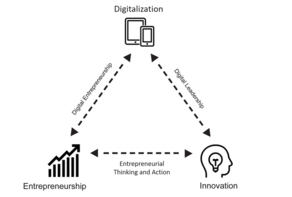Current Topics
The future of customer relationship management in the digital age
Customer relationships hinge on omnichannel touchpoints – digital, physical, and social interactions that connect businesses and consumers. While tech giants like Apple, Google and Amazon leverage multiple digital touchpoints – such as apps, smart devices, and AI driven platform-based services – to strengthen customer ties, many other organizations struggle to maintain meaningful customer relationships.
This asymmetry is not just a resource constraint, but a strategic gap. As a result, many organizations lose valuable insights, making it increasingly difficult for them to understand customers’ evolving needs, personalize services, innovate, anticipate demands, and successfully launch new products.
A recent study by Baidya et al. (2023) highlights that meaningful customer relationships stem from functional, informational, and emotional touchpoints. Furthermore, Kopalle et al. (2020) stress the importance of digital customer orientation. Yet, excessive or poorly designed interactions might lead to digital fatigue rather than engagement.
In contrast to start-ups and smaller firms, larger organizations not only retain a continuous stream of customer data but might even influence customer behavior and preferences through habit formation, behavioral nudges and ecosystem lock-in. As digital ecosystems evolve, understanding how companies can prevent customer detachment while fostering long-term engagement will be essential for sustained innovation and market success. The future of customer engagement depends on rethinking digital touchpoints, ensuring that smaller firms have access to the strategies that enable them to compete effectively with industry giants.
This research will explore how platform-based firms can bridge this gap by not only providing theoretical insights into digital customer orientation and the retention of touchpoints but also offering practical implications for businesses and platform operators. The goal is to develop solutions and uncover best practices that foster sustainable and trust-driven customer relationships that foster long-term business success in the digital age.
- Baidya, M., Maity, B., & Goswami, S. (2023). A value-driven touchpoints strategy for managing the customer experience process. Business Process Management Journal, 29(7), 2147–2166. doi.org/10.1108/BPMJ-02-2023-0093
- Kopalle, P. K., Kumar, V., & Subramaniam, M. (2020). How legacy firms can embrace the digital ecosystem via digital customer orientation. Journal of the Academy of Marketing Science, 48(1), 114–131. doi.org/10.1007/s11747-019-00694-2
Contact
Psychological safety in coworking spaces
Coworking spaces are mostly used by self-employed people and start-ups. Despite the mostly sensitive business ideas, which are often not protected against misuse and theft of intellectual property in coworking spaces, coworkers regularly exchange business ideas and best practices. This creates a climate of "coopetition", a fusion of competitive and collaborative dynamics. Coworking spaces also appear to offer a high level of psychological safety for coworkers, as they feel secure when sharing potentially sensitive information.
This master's thesis uses quantitative methods (e.g. a survey) to determine the climate of psychological safety in coworking spaces, the role played by the space and its management, and the effects this climate has on coworkers.
- Bouncken, R. B., Laudien, S. M., Fredrich, V., & Görmar, L. (2018). Coopetition in coworking-spaces: value creation and appropriation tensions in an entrepreneurial space. Review of Managerial Science, 12(2), 385-410. doi.org/10.1007/s11846-017-0267-7
- Parrino, L. (2015). Coworking: Assessing the role of proximity in knowledge exchange. Knowledge Management Research and Practice, 13(3), 261-271. doi.org/10.1057/kmrp.2013.47
Contact
Transformative Artificial Intelligence and Entrepreneurship
Transformative Artificial Intelligence (AI) has the potential to bring about profound societal changes, similar to the agricultural or industrial revolutions. These technologies offer significant efficiency gains and transform the way tasks are performed, leading to growing interest in their study. Particularly in entrepreneurship, the question arises of how AI influences the innovation processes and business models of startups.
This thesis aims to write about the impact of transformative AI on the innovative capabilities of startups based on current research on AI and innovation. Key research questions include:
- Theorizing "algorithmic entrepreneurship"
- Can AI create resource abundance, thereby overcoming the typical resource scarcity in entrepreneurship and challenging leading startup methods (e.g., effectuation/bricolage, bootstrapping, lean startup)?
- Do classic research findings and theories (e.g., on the role of knowledge and human and social capital in entrepreneurship) still hold in the new AI era?
- How can AI impact entrepreneurial finance (e.g., AI-powered financial planning for entrepreneurs, management and decisions of VC investment portfolios) and resource acquisition (e.g., preparation of entrepreneurs' pitches, investors' due diligence)?
- Does AI change the age curve associated with entrepreneurship (does it replace the advantage of industry experience, and do we therefore see an AI-empowered rise of young entrepreneurs)?
- How can AI contribute to equality and diversity (e.g., neurodiversity, closing the gender gap)?
- How can AI support entrepreneurs' cognition, decision-making, and psychological well-being?
- Berente, N., Gu, B., Recker, J., & Santhanam, R. (2021). Managing artificial intelligence. MIS Quarterly, 45(3), 1433-1450. DOI: 10.25300/MISQ/2021/16274
- Lévesque, M., Obschonka, M., & Nambisan, S. (2022). Pursuing impactful entrepreneurship research using artificial intelligence. Entrepreneurship Theory and Practice, 46(4), 803-832. https://doi.org/10.1177/1042258720927369
- Obschonka, M., & Audretsch, D. B. (2020). Artificial intelligence and big data in entrepreneurship: a new era has begun. Small Business Economics, 55, 529-539. https://doi.org/10.1007/s11187-019-00202-4
Venturing Into the Future: The Impact of Corporate Venture Capital
In today's corporate landscape, the importance and influence of corporate venture capital (CVC) has increased dramatically. CVC, equity investments by established companies in privately held companies, is a fundamental aspect of entrepreneurial finance. Seven of the top ten companies in the world by revenue are engaged in significant CVC, including Google, Intel, and Salesforce. Your master's thesis will explore CVC's strategies, mechanisms, and impact on innovation, economic growth, and corporate success. In general, your thesis can follow five main themes. (1) corporate antecedents, i.e., the factors that lead incumbent firms to make CVC investments; (2) corporate consequences, i.e., the impact of CVC investments on the parent firm; (3) organization and governance of the CVC entity; (4) start-up antecedents, i.e., the factors that lead start-ups to seek CVC support; and (5) start-up consequences, i.e., the impact of CVC support on start-up performance.
To ensure a good thesis start, you will receive a current literature review to discuss important literature in the field and identify a potential research gap. In addition, you will be working with existing data but will need to collect additional data based on the research gap you place.
- Basu, S., Phelps, C. & Kotha, S. (2011). Towards Understanding Who Makes Corporate Venture Capital Investments and Why. Journal of Business Venturing, 26(2), 153–171. https://doi.org/10.1016/j.jbusvent.2009.07.001
- Dushnitsky, G. & Lenox, M. J. (2005). When Do Firms undertake R&D by Investing in New Ventures? Strategic Management Journal, 26(10), 947–965. https://doi.org/10.1002/smj.488
The Evolution of Conceptual Contributions in Entrepreneurship Research
In this thesis, the development of conceptual contributions in entrepreneurship research is explored. The focus is on how theories in the field of entrepreneurship have evolved over time. By documenting the research topics in this area over the years, a foundation is established to understand what is considered a valuable contribution in this field.
This work tracks and highlights the temporal development in the science of entrepreneurship. It illustrates how conceptual thinking has enabled researchers to create new knowledge. This is particularly facilitated by the use of computer-aided text analysis methods, such as LIWC.
The following core topics are addressed in the thesis:
- The integration of the framework by MacInnis (2011) in entrepreneurship research: Investigating the extent to which conceptualizations have been incorporated into entrepreneurship research.
- Changes in theoretical approaches: Analysis of shifts in theoretical frameworks and approaches within entrepreneurship research over time. Additionally, it aims to identify which unique theories have emerged from entrepreneurship research and which theories have been borrowed.
- Methodological trends: Assessment of methodological approaches and their development over time.
- Kindermann, B., Wentzel, D., Antons, D., & Salge, T. O. (2023). EXPRESS: Conceptual Contributions in Marketing Scholarship: Patterns, Mechanisms, and Rebalancing Options. Journal of Marketing, 00222429231196122. https://doi.org/10.1177/00222429231196122
- MacInnis, D. J. (2011). A framework for conceptual contributions in marketing. Journal of Marketing, 75(4), 136-154. https://doi.org/10.1509/jmkg.75.4.136
Solving todays 'big challenges' with entrepreneurship and digitalization research
You have an idea how to solve one of our society's "big challenges"? Inspired by the European Commission major societal challenges are:
- Health (e. g. pandemics), demographic change;
- Hunger, poverty and unequal distribution of wealth;
- Climate change (e. g. global warming, biodiversity loss, natural disasters);
- Transformation to a secure, clean and sustainable economy;
- Europe in a changing world - inclusive, innovative and reflective societies as an alternative to the rising protectionism.
For these societal challenges, that are not yet fully understood, solutions are urgently required (OECD, 2020). Are you eager to conduct research and find a solution how we can tackle any of these major societal challenges?
-
Fernhaber, S. A., & Zou, H. (2022). Advancing societal grand challenge research at the interface of entrepreneurship and international business: A review and research agenda. Journal of Business Venturing, 37(5). https://doi.org/10.1016/j.jbusvent.2022.106233
-
George, G., Merrill, R. K., & Schillebeeckx, S. J. D. (2021). Digital Sustainability and Entrepreneurship: How Digital Innovations Are Helping Tackle Climate Change and Sustainable Development. Entrepreneurship: Theory and Practice, 45(5), 999–1027. https://doi.org/10.1177/1042258719899425
-
Nambisan, S., & George, G. (2024). Digital Approaches to Societal Grand Challenges: Toward a Broader Research Agenda on Managing Global-Local Design Tensions. Information Systems Research, 1–18. https://doi.org/10.1287/isre.2023.0152
-
Ricciardi, F., Rossignoli, C., & Zardini, A. (2021). Grand challenges and entrepreneurship: Emerging issues, research streams, and theoretical landscape. International Entrepreneurship and Management Journal, 1–33. https://doi.org/10.1007/S11365-021-00771-5
Building trust in technology to drive use: the impact of trust certificates on data sharing and intentions to use
In today's digital world, trust in technologies plays a crucial role in technology use. Especially in the smart home and smart city context, where highly sensitive data is exchanged. Despite many users' concerns about the security of their data and the misuse of personal information, they are often willing to share their data and interact with digital platforms (Möhlmann, 2021). This is especially true if they feel safe and trust the service providers to handle their data responsibly. In addition, current research indicates that trust certificates can be an effective means of increasing data sharing and acceptance of digital services (Schuetz et al., 2024).
The aim of this master's thesis is to use quantitative methods (e.g. via a survey or AB tests) to investigate the extent to which certificates strengthen users' trust in technologies. Does this increase their willingness to share data and influence their intention to use the technology? The aim is to analyze how the introduction of such certificates affects the perception of privacy and the actual behavior of users. Especially regarding different types of users.
This study should not only provide theoretical insights into the topic of trust in technologies, but also highlight practical implications for companies and technology providers. The aim is to improve the design of digital products and services.
- Möhlmann, M. (2021). Unjustified trust beliefs: Trust conflation on sharing economy platforms. Research Policy, 50(3). https://doi.org/10.1016/j.respol.2020.104173
- Schuetz, S., Kuai, L., Lacity, M. C., & Steelman, Z. (2024). A qualitative systematic review of trust in technology. Journal of Information Technology, 0(0), 1–22. https://doi.org/10.1177/02683962241254392


